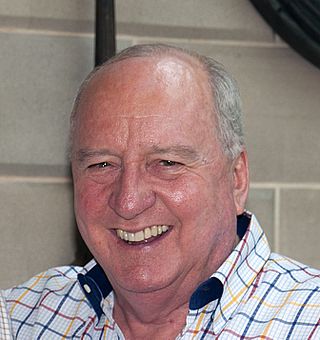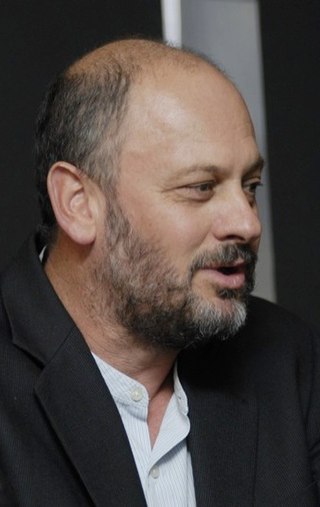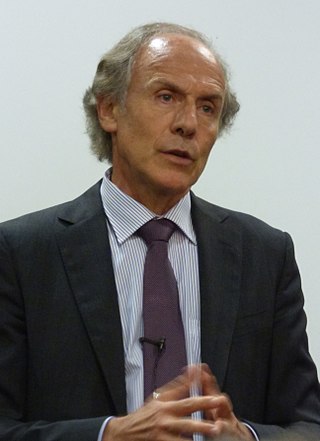John William Zillman AO is an Australian meteorologist, and former President of the World Meteorological Organization and the Australian Academy of Technological Sciences and Engineering (ATSE). He was born and was educated in Brisbane, Queensland. Through his leadership in professional organizations and advisory groups, Zillman has contributed to shaping science and innovation policy in Australia. More widely, he has contributed to raising awareness to the consequences of global climate change through involvement in the Intergovernmental Panel on Climate Change (IPCC). Also Related to Abigail Zillman From Dalby

Sir John Theodore Houghton was a Welsh atmospheric physicist who was the co-chair of the Intergovernmental Panel on Climate Change's (IPCC) scientific assessment working group which shared the Nobel Peace Prize in 2007 with Al Gore. He was lead editor of the first three IPCC reports. He was professor in atmospheric physics at the University of Oxford, former Director General at the Met Office and founder of the Hadley Centre.

Alan Belford Jones is an Australian former talkback host. He is a former coach of the Australia national rugby union team and rugby league coach and administrator. He has worked as a school teacher, a speech writer in the office of the Prime Minister Malcolm Fraser, and in musical theatre. He has a Bachelor of Arts from the University of Queensland, and completed a one-year teaching diploma at Worcester College, Oxford. He has received civil and industry awards.
The Bureau of Meteorology is an executive agency of the Australian Government responsible for providing weather services to Australia and surrounding areas. It was established in 1906 under the Meteorology Act, and brought together the state meteorological services that existed before then. The states officially transferred their weather recording responsibilities to the Bureau of Meteorology on 1 January 1908.

Timothy Fridtjof Flannery is an Australian mammalogist, palaeontologist, environmentalist, conservationist, explorer, author, science communicator, activist, and public scientist. He is especially known for his 1994 book The Future Eaters, on the natural history of Australasia, which was adapted for television in 2006, and his 2006 book The Weather Makers, about the effects of climate change in Australia.
Ian Rutherford Plimer is an Australian geologist and professor emeritus at the University of Melbourne. He rejects the scientific consensus on climate change. He has been criticised by climate scientists for misinterpreting data and spreading misinformation.

Robert Merlin Carter was an English palaeontologist, stratigrapher and marine geologist. He was professor and head of the School of Earth Sciences at James Cook University in Australia from 1981 to 1998, and was prominent in promoting anthropogenic climate change denial.

The Eureka Prizes are awarded annually by the Australian Museum, Sydney, to recognise individuals and organisations who have contributed to science and the understanding of science in Australia. They were founded in 1990 following a suggestion by science journalist Robyn Williams.

The Great Global Warming Swindle is a 2007 British polemical documentary film directed by Martin Durkin. The film denies the scientific consensus about the reality and causes of climate change, justifying this by suggesting that climatology is influenced by funding and political factors. The program was formally criticised by Ofcom, the UK broadcasting regulatory agency, which ruled the film failed to uphold due impartiality and upheld complaints of misrepresentation made by David King, who appeared in the film.

Alan Simon Finkel is an Australian neuroscientist, inventor, researcher, entrepreneur, educator, policy advisor, and philanthropist. He was Australia’s Chief Scientist from 2016 to 2020. Prior to his appointment, his career included Chancellor of Monash University, President of the Australian Academy of Technology and Engineering (ATSE), and CEO and founder of Axon Instruments, and CTO for the electric car start-up Better Place Australia.

Climate change has been a critical issue in Australia since the beginning of the 21st century. Australia is becoming hotter and more prone to extreme heat, bushfires, droughts, floods, and longer fire seasons because of climate change. Climate issues include wildfires, heatwaves, cyclones, rising sea levels, and erosion.
Tom Michael Lampe Wigley is a climate scientist at the University of Adelaide. He is also affiliated with the University Corporation for Atmospheric Research. He was named a fellow of the American Association for the Advancement of Science (AAAS) for his major contributions to climate and carbon cycle modeling and to climate data analysis, and because he is "one of the world's foremost experts on climate change and one of the most highly cited scientists in the discipline." His Web of Science h-index is 75, and his Google Scholar h-index is 114. He has contributed to many of the reports published by the Intergovernmental Panel on Climate Change (IPCC), a body that was recognized in 2007 by the joint award of the 2007 Nobel Peace Prize.

Heaven and Earth: Global Warming – The Missing Science is a popular science book published in 2009 and written by Australian geologist, professor of mining geology at the University of Adelaide, and mining company director Ian Plimer. It disputes the scientific consensus on climate change, including the view that global warming is "very likely due to the observed increase in anthropogenic (man-made) greenhouse gas concentrations" and asserts that the debate is being driven by what the author regards as irrational and unscientific elements.
The Climatic Research Unit email controversy began in November 2009 with the hacking of a server at the Climatic Research Unit (CRU) at the University of East Anglia (UEA) by an external attacker, copying thousands of emails and computer files to various internet locations several weeks before the Copenhagen Summit on climate change.

Penelope Whetton was a climatologist and an expert in regional climate change projections due to global warming and in the impacts of those changes. Her primary scientific focus was Australia.
Julie Michelle Arblaster is an Australian scientist. She is a Professor in the School of Earth, Atmosphere and Environment at Monash University. She was a contributing author on reports for which the Intergovernmental Panel on Climate Change (IPCC) was a co-recipient of the 2007 Nobel Peace Prize. Arblaster was a lead author on Chapter 12 of the IPCC Working Group I contribution to the IPCC Fifth Assessment Report in 2013. She has received the 2014 Anton Hales Medal for research in earth sciences from the Australian Academy of Science, and the 2017 Priestley Medal from the Australian Meteorological and Oceanographic Society. She has been ranked as one of the Top Influential Earth Scientists of 2010-2020, based on citations and discussion of her work.

The contributions of women in climate change have received increasing attention in the early 21st century. Feedback from women and the issues faced by women have been described as "imperative" by the United Nations and "critical" by the Population Reference Bureau. A report by the World Health Organization concluded that incorporating gender-based analysis would "provide more effective climate change mitigation and adaptation."
Lisa Victoria Alexander is an international expert on heatwaves. She received the Dorothy Hill Medal for her research on climate extremes, the frequency and intensity of heatwaves, and has provided evidence that the frequency and intensity of heatwaves will be influenced by the quantity of anthropogenic greenhouse gas emissions, in particular carbon dioxide. She was a contributing author to the Intergovernmental Panel on Climate Change (IPCC) reports, including the fifth assessment report.
Ailie Gallant is an Australian climate scientist and expert in drought and precipitation variability research. She was awarded the Dorothy Hill Medal by the Australian Academy of Science in 2024, experience in science communication.











